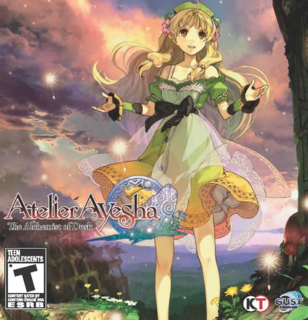Even after Arland, Atelier is as good as ever
In terms of gameplay, AA brings a lot of changes to the series. The battles, already a fantastic experience before, are being made even more tactical by allowing you to walk around enemies and attack from behind. The chain skills you can use also vary depending on your position (for example a character can't cover your teammate if (s)he's on the opposite side, but can tell her to concentrate or to recover). As usual, meticulous panning is needed every time you sortie, as the unforgiving hostiles will certainly get out if you don't bring enough healing/offensive items.
Alchemy has been simplified a lot. Quantities have been equally normed : most of the time, you use 1 to make 3, which seems far too simple. I personally fancy the Kafkaesque recipes of the previous Atelier games, which demanded a nearly lunatic mind organization. Furthermore, traits are now automatically chosen. I can no longer add to your creation some super-skill on a rare material you've found in a dark and dangerous cave. Let's say the item you're about to make can have HP+10%, STR+5, SPD+5 or Stats+2, it will actually have one, several or all these traits depending on the quality you achieve. But if own a material with let's say All Stats+5, you can never implement this trait anywhere. Probably disappointing for purists, this new system saves you some efforts and allows you to focus on other parts of the game.
In the other hand, there are MANY more ingredients than before. I've come across something like hundreds of them! In this department, let's stress that objects now are sorted by groups of quantities, that is to say that objects of same nature & quality take only one square in your basket. This is a dramatic improvement over previous baskets, because you can carry more and longer. You can no longer choose at gathering points, but a can choose to gather more or less at each point, which enables you to save time. Your allies also pick additional ingredients time to time as a bonus. This new gathering system alleviates the constraints you had in past games and allows maximum efficiency. Again, this allows a smoother progression in the game.
As always in Atelier games, the story is limited in time. Each day must be used wisely to achieve as much as possible in the years that compose the game. You'll quickly have to choose between several objectives, generally very far from each other, in order to advance in the story, complete side quests, hunt fiends, gather or deliver, not to menion the mini-events that take place during set period of time. You consequently have to define priorities and make mid/long term plans to win the race against time. Talking of the story, so far I find it less compelling than the others. Ayesha is looking for her missing sister, a bit like Totori was in search for her mother, but it's far less emotionally-packed. It's kind of a mild trade-off between the Totori's moving story and Meruru's eccentricity. In fact, it only makes sense at the very end, when Keithgrif comes to your party. At this moment, the problematic around the essence of alchemy and its legitimacy is very interesting and add some gravity to the final fights.
The exceptional so Japanese sense of humor is still there : character events are wonderful as always. Music is at it finest, with many beautiful tracks and no less than a dozen of battle themes. Difficulty setting is rather weird unfortunately : most of the story bosses are no problem for Atelier fans, but post-game bosses crush my maxed characters within 3 turns. On the other hand, I did appreciate the possibility to choose my ending once time is up. You can therefore see every ending you've flagged during the game by reloading your save, which is only normal after all. I does hurt the replay value, but you'll still have to play it twice to see everything. With a sixty-hour long game, it makes tremendous value.
Even if this newest Atelier probably won't surpass its glorious predecessors, it remains a thoughtfully well-fought game, innovating smartly at the same time. By simplifying alchemy and rationalizing item management, it also makes it easier for newcomers to throw themselves in the series.

